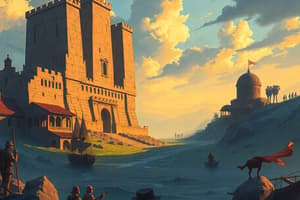Podcast
Questions and Answers
What is the primary role of a historian?
What is the primary role of a historian?
- To ensure that historical facts are always objective and unquestionable
- To record events as they occur without analysis
- To solely produce historical knowledge through personal experiences
- To collect and interpret historical evidence to create historical knowledge (correct)
Which statement accurately reflects Edward Hallett Carr's view on historical facts?
Which statement accurately reflects Edward Hallett Carr's view on historical facts?
- Facts can exist independently of the historian's perspective.
- Historians should disregard context when defining historical facts.
- Historical facts are determined through the careful analysis of historians. (correct)
- Historical facts are absolute truths that do not change over time.
What does the context of a historian's research influence?
What does the context of a historian's research influence?
- The level of scrutiny applied by their peers
- The productivity of the historian in terms of publication
- The timeline of historical events as perceived by the public
- The way historical sources are interpreted and selected (correct)
Which aspect is crucial for ensuring the scientific quality of historical knowledge?
Which aspect is crucial for ensuring the scientific quality of historical knowledge?
Why are historians subject to scrutiny by their peers?
Why are historians subject to scrutiny by their peers?
Who is known as the 'Father of History'?
Who is known as the 'Father of History'?
What does historiography refer to?
What does historiography refer to?
Which philosopher argued that history should be studied for its own sake?
Which philosopher argued that history should be studied for its own sake?
What concept describes history's complexity and its various perspectives?
What concept describes history's complexity and its various perspectives?
Which period saw the rise of Christianity and significant influence on historical interpretation?
Which period saw the rise of Christianity and significant influence on historical interpretation?
What was a consequence of the rise of positivist philosophy in history?
What was a consequence of the rise of positivist philosophy in history?
Benedetto Croce's assertion that 'All history is contemporary history' implies what?
Benedetto Croce's assertion that 'All history is contemporary history' implies what?
Which of the following statements is true regarding the legacy of Ferdinand Marcos in Philippine history?
Which of the following statements is true regarding the legacy of Ferdinand Marcos in Philippine history?
What defines a primary source in historical research?
What defines a primary source in historical research?
What is the main purpose of external criticism?
What is the main purpose of external criticism?
How do secondary sources enhance historical understanding?
How do secondary sources enhance historical understanding?
What is internal criticism used for in analyzing historical sources?
What is internal criticism used for in analyzing historical sources?
Why is it challenging for historians to create a full picture of the past?
Why is it challenging for historians to create a full picture of the past?
Which statement about historical sources is true?
Which statement about historical sources is true?
What is a potential issue that primary sources may face over time?
What is a potential issue that primary sources may face over time?
What is the ultimate goal of applying external and internal criticisms in historical research?
What is the ultimate goal of applying external and internal criticisms in historical research?
What is the main purpose of external criticism in historical research?
What is the main purpose of external criticism in historical research?
Which of the following best describes internal criticism?
Which of the following best describes internal criticism?
What can the use of unverified sources lead to in historical conclusions?
What can the use of unverified sources lead to in historical conclusions?
How did historians like William Henry Scott approach the Code of Kalantiaw?
How did historians like William Henry Scott approach the Code of Kalantiaw?
What is indicated by the conclusion of the National Historical Commission of the Philippines regarding Ferdinand Marcos' war medals?
What is indicated by the conclusion of the National Historical Commission of the Philippines regarding Ferdinand Marcos' war medals?
What role do primary sources play in historical analysis?
What role do primary sources play in historical analysis?
What is a potential danger of historical narratives crafted from secondary sources alone?
What is a potential danger of historical narratives crafted from secondary sources alone?
How can the understanding of historical context affect the interpretation of history?
How can the understanding of historical context affect the interpretation of history?
What groups formed the Katipunan?
What groups formed the Katipunan?
Why did the Katipunan write almost exclusively in Filipino?
Why did the Katipunan write almost exclusively in Filipino?
What did American historians refer to the conflict with the Philippines as?
What did American historians refer to the conflict with the Philippines as?
Which historian is recognized as a pioneer of nationalist historiography in the Philippines?
Which historian is recognized as a pioneer of nationalist historiography in the Philippines?
What concept did Amado Guerrero adopt in his historical writings?
What concept did Amado Guerrero adopt in his historical writings?
What was the purpose of the Pantayong Pananaw according to Zeus Salazar?
What was the purpose of the Pantayong Pananaw according to Zeus Salazar?
Who among the following was considered a front-runner of progressive and Marxist history?
Who among the following was considered a front-runner of progressive and Marxist history?
What was one effect of the American colonial period on education in the Philippines?
What was one effect of the American colonial period on education in the Philippines?
Flashcards are hidden until you start studying
Study Notes
Historian's Role and Methodology
- Historians pursue continuous historical knowledge and must adapt to new evidence and developments.
- They produce historical knowledge by interrogating the past through the gathering and interpretation of evidence.
- Historical facts are determined through the historian's insights; objectivity is challenged by context and personal bias.
- Historical methodology involves techniques and rules for selecting and interpreting sources accurately; it's a professional academic discipline subjected to peer scrutiny.
Historical Inquiry and Storytelling
- History revolves around human activities and seeks to explain past events and actions.
- Herodotus is regarded as the "Father of History," establishing history as a field of study, while Thucydides is considered the "Father of Scientific History" for his objective approach.
- Historiography is the study of historical writing and interpretation, helping to better understand past contexts.
Medieval Period and Historical Development
- Christianity and the Church influenced the recording of history, often overshadowing human deeds with divine narratives.
- Positivist philosophy contributed to history being treated as a scientific discipline, advocating for a focus on studying history for its own sake (Historicisim).
- Leopold von Ranke emphasized objective representation of historical facts, which shaped the profession further.
Emergence of Historical Subdisciplines
- The formation of new subdisciplines (e.g., Women’s, Environmental, and Urban History) arose from contemporary issues requiring detailed historical examination.
- Benedetto Croce argued that all history is contemporary, stressing its relevance to present times.
- The Marcos family's revisionist efforts to recast their regime's legacy highlight the impact of historical interpretation and bias.
Historical Sources and Criticism
- Primary sources are firsthand accounts from the period under study, while secondary sources are derived from the analysis of primary materials.
- External criticism validates the authenticity of primary sources through the examination of their material characteristics and context.
- Internal criticism analyzes the content of primary sources, considering their creation circumstances to ensure accurate interpretation.
Debunking Falsifications
- Historians combat false claims through rigorous scrutiny, reaffirming the importance of verifying sources.
- Cases like the Code of Kalantiaw and alleged war exploits of Ferdinand Marcos exemplify errors in historical representation due to unverified sources.
Philippine Historiography and National Identity
- The development of history as a discipline in the Philippines is influenced by various social and political contexts.
- The Katipunan, comprising diverse members, utilized Filipino to foster national identity during the revolution.
- American colonialism reshaped historical narratives, emphasizing perspectives that aligned with U.S interests, labeling the Philippine-American conflict as an "insurrection."
Filipino Nationalist Historiography
- Prominent historians like Teodoro Agoncillo and Renato Constantino shaped a nationalist interpretation of history focused on the Filipino experience.
- Agoncillo's work highlights the Philippine Revolution, while Constantino introduced a progressive, Marxist lens to historical analysis.
- Zeus Salazar's Pantayong Pananaw framework advocates reclaiming history through a perspective centered on the Filipino populace.
Studying That Suits You
Use AI to generate personalized quizzes and flashcards to suit your learning preferences.




